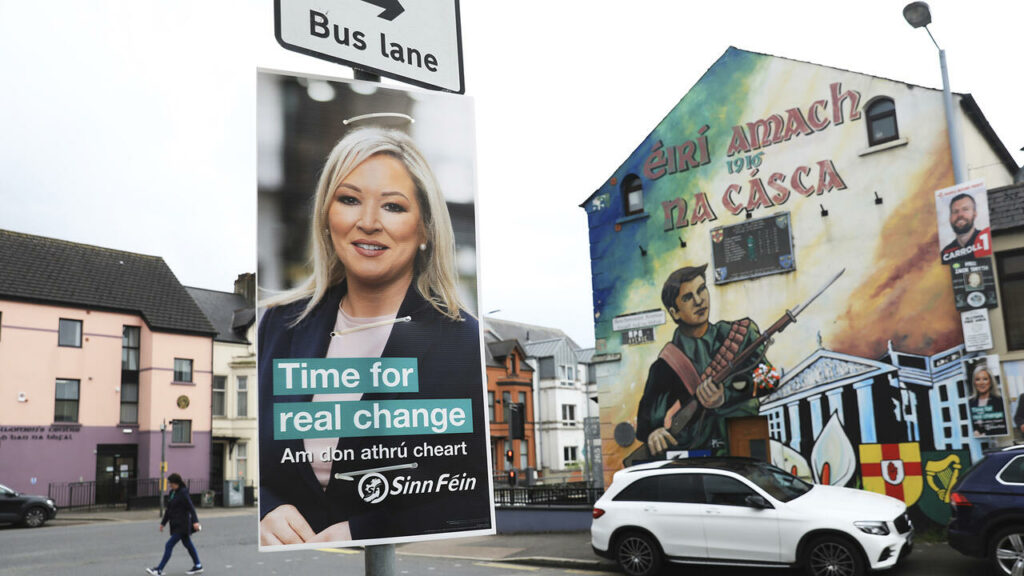Published on :
For the first time in 100 years, the Sinn Fein party, which advocates the reunification of Ireland, came out on top in the parliamentary elections on 5th May. He is ahead of the Unionists of the DUP, loyal to the British crown. Savoring its electoral success, Sinn Fein has already announced that a “new era” will dawn. But the risk of paralysis remains. Interview with Fabrice Mourlon, professor at the Sorbonne Nouvelle University
RFI: Sinn Fein becomes the leading political force in Northern Ireland. Is this a historic turning point?
Fabrice Mourlon: It is true that it is a historic victory. This is the first time that the nationalists are stronger than the other parties. Sinn Fein won 27 seats, but the DUP (Democratic Unionist Party) still won 25 seats. So there are only two seats apart. The other important point is the spectacular rise of the centrist Alliance party, which has become the third party in Northern Ireland (with 17 seats). It is a non-confessional political party. Unlike Sinn Fein and the DUP, the question of reunification is secondary for this party.
Michelle O’Neill, leader of Sinn Fein and likely future local Prime Minister, is already announcing a » new era « . What will be its roadmap and what is its room for manoeuvre?
In its program, Sinn Fein has focused on social and economic issues, on purchasing power and therefore on issues that affect people on a day-to-day basis. On the other hand, concerning the question of reunification, it cannot be decided by the Northern Irish government, since it is the Secretary of State for Northern Ireland, who is part of the government in London, who decides to whether or not to call a referendum.
In public opinion, do you see a significant current in favor of reunification with Ireland or is the victory of the nationalists explained rather by the weakness of the unionists?
A bit of both. Opinion polls about Irish reunification fluctuate wildly. Lately, around 30 to 35% of people say they are in favor of reunification. Even if there is a desire on the part of some to see a unified Ireland, perhaps we still have to wait a bit to see more clearly. Because all the debates that are linked to Brexit and its consequences have enormously revived tensions, especially within the DUP which has become enormously fragmented. In the newspapers this morning, commentators are advising Unionists to stand united against Sinn Fein nationalists. Generally speaking, people would like the institutions in Northern Ireland to work, since the institutions in Northern Ireland represent their day-to-day interests.
Do you see a risk of political paralysis, since under the 1998 peace agreement, unionists and nationalists are obliged to govern together?
In fact, it is the first two formations which count the most votes in the Assembly of Northern Ireland which obtain the post of Prime Minister and that of Deputy Prime Minister. So the problem that may arise is that the DUP refuses to appoint someone as Deputy Prime Minister. So they could completely paralyze the institutions.
But Sinn Fein has already promised to overcome divisions. Is this realistic in your opinion?
I hope so. I think Sinn Fein has every interest in governing with the DUP. They have to make the institutions work together. The local assembly and the local executive must solve the daily problems of the people. This is what is important for voters. So they have every interest in making the institutions work, otherwise they will not be able to govern. The 1998 Good Friday Peace Agreement provides for a de facto consensus government, ie the first two political forces hold the positions of Prime Minister and Deputy Prime Minister. Then, the ministers are chosen from among the other political parties, which means that power is shared anyway.
► Also to listen: Grand Reportage – 50 years later, the wounds of Bloody Sunday are still bleeding
In your opinion, will this victory for Sinn Fein revive the debate on the end of the partition of Ireland?
This debate has indeed taken place again since Brexit. It’s like a ghost coming back. Brexit brings these questions back to the fore, since there was the question of the border, it caused tensions to reappear. Sinn Fein has always campaigned for reunification, this is nothing new. The peace in Northern Ireland remains a fragile peace even today.
And do you think that the question of Brexit will come up again in the political debate in Northern Ireland?
The problem is that this story is really squaring the circle. Putting a border between the Republic of Ireland and Northern Ireland would immediately set things on fire. And that is why the negotiations were extremely political. Northern Ireland is an issue that had not been taken into account in the United Kingdom by Boris Johnson and those who campaigned for Brexit. It wasn’t their first problem. Their only concern was to take the United Kingdom out of the European Union. But obviously, Northern Ireland is weakened by Brexit.
.

